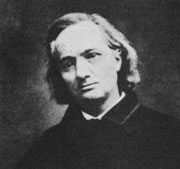On this date in 1821, influential poet Charles Pierre Baudelaire was born in Paris into an aristocratic, Catholic family. His father, a former priest, had, at age 60, married a 26-year-old woman. After Charles’ father died, his mother remarried, leading to an estrangement and what he recalled as a feeling of “eternal solitude” during his childhood. He abandoned religious notions in his youth. Educated at College de Lyon and Lycee Louis le Grand, he entered law school, where he apparently acquired both syphilis and an opium habit but no law degree.
Baudelaire was described as being “on the barricades” of the revolution of 1848. He translated Edgar Allan Poe’s Tales in 1856. His own collection of 151 short poems, Les Fleurs du Mal (The Flowers of Evil) came out in 1857, including the poem “Les litanies de Satan.” He, the publisher and the printer were all prosecuted for obscenity and blasphemy and found guilty. Six poems were excised to conform to the laws. He had several mistresses, primarily Jeanne Duval, a woman of mixed race whom he immortalized in his poem “Black Venus.”
Along with Mallarme and Verlaine, Baudelaire was one of the so-called “Decadents.” He had some success as a critic, and knew many writers and painters. His life ended in a medical downward spiral, but not before penning “Pauvre Belgique,” a collection of insults toward that country, where he had lived as an invalid, which has been published in several editions. Baudelaire died in his mother’s arms. (D. 1867)


